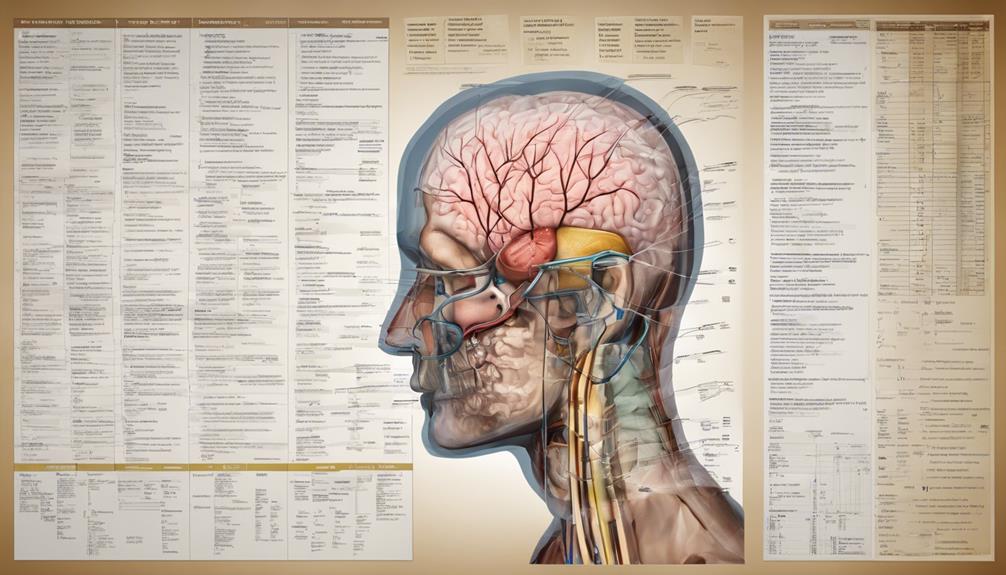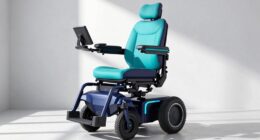Studying healthcare data, the ICD-10 code F03.90, which signifies Dementia Without Behavioral Disturbance, prompts significant inquiries. Grasping the intricacies of this specific code is crucial not only for precise diagnosis, but it also influences treatment choices and the development of care plans for patients.
As we explore further, we will uncover the complexities surrounding this specific classification and how it influences the broader landscape of dementia management.
Overview of ICD-10 Code F03.90
Describing unspecified dementia without behavioral disturbance, the ICD-10-CM code F03.90 is utilized for billing and reimbursement purposes in adult patients aged 15-124 years. This code, F03.90, specifically addresses dementia cases where behavioral disturbances aren't present. It's crucial for accurately documenting and billing cases of dementia in adult patients falling within the specified age range.
F03.90 is particularly focused on cognitive impairments such as memory loss, personality changes, and emotional problems commonly associated with dementia. By using this code, healthcare providers ensure proper classification and billing for patients presenting with symptoms of dementia but without accompanying behavioral issues.
It's important to note that F03.90 doesn't encompass psychotic, mood, or anxiety disturbances, making it a specific code tailored for cases of dementia lacking behavioral disruptions. Healthcare professionals rely on this code to streamline the billing process and facilitate appropriate reimbursement for the care provided to adult patients experiencing memory and cognitive difficulties.
Implications for Healthcare Providers

For healthcare providers, understanding the implications of ICD-10 code F03.90 is crucial in accurately diagnosing and treating cases of unspecified dementia without behavioral disturbance.
- Accurate Diagnosis and Treatment Planning: Properly utilizing ICD-10 code F03.90 ensures precise identification of unspecified dementia cases in adult patients, aiding in tailored treatment plans.
- Medical Record Keeping: The code aids in maintaining detailed medical records by distinguishing cases of dementia without behavioral disturbances, facilitating comprehensive patient care.
- Healthcare Reimbursement: Correct use of the code is vital for billing and reimbursement processes, ensuring providers receive appropriate compensation for treating cases of unspecified dementia.
- Identifying Severity and Specific Disturbances: While the code signifies dementia without behavioral issues, it doesn't specify the severity or particular behavioral, psychotic, mood, or anxiety disturbances present, necessitating a thorough evaluation by healthcare professionals.
Coding Guidelines and Considerations
Navigating the complexities of ICD-10 coding guidelines for dementia without behavioral disturbance requires attention to specific diagnostic criteria and documentation standards. When assigning the correct code, it's essential to consider that F03.90 is the specific code for unspecified dementia without behavioral disturbance in adult patients aged 15-124 years. This code encompasses disorders due to known physiological conditions affecting the brain, excluding psychotic, mood, or anxiety disturbances. By adhering to these guidelines, healthcare providers ensure accurate diagnosis and appropriate treatment planning for patients with dementia but no behavioral issues.
| Aspect | Details | Importance |
|---|---|---|
| Specific Code | F03.90 | Essential for accurate billing |
| Adult Dx | Patients aged 15-124 years | Ensures appropriate age group selection |
| Known Physiological Condition | Disorders due to known physiological conditions affecting the brain | Helps in identifying the root cause |
| Mental Disorders Grouped Together | Excludes psychotic, mood, or anxiety disturbances | Clarifies the nature of the diagnosis |
Importance of Accurate Documentation

Proper documentation of dementia without behavioral disturbance is pivotal for ensuring accurate classification and effective treatment planning.
- Diagnosis Code: Accurate documentation is essential for assigning the correct diagnosis code for dementia without behavioral disturbance, facilitating proper identification and tracking of the condition in medical records.
- Treatment Planning: Detailed documentation assists healthcare providers in creating tailored treatment plans that address the specific cognitive issues associated with dementia without behavioral disturbance.
- Reimbursement: Precise documentation supports accurate medical coding, which is crucial for reimbursement purposes and ensures healthcare facilities are appropriately compensated for the care provided.
- Progression Tracking: Healthcare providers rely on accurate documentation to monitor the progression of dementia without behavioral disturbance over time, enabling them to make informed decisions regarding patient care and interventions.
Accurate documentation not only aids in reimbursement and treatment planning but also contributes to research efforts aimed at understanding the trends and outcomes associated with dementia without behavioral disturbances.
Case Studies and Examples
One important aspect to consider when delving into case studies and examples is understanding the diverse manifestations of dementia without behavioral disturbance in clinical settings. Alzheimer's disease is a common cause of unspecified dementia, presenting symptoms such as memory loss, personality changes, and emotional problems in adult patients. Proper diagnosis is crucial for accurate treatment planning and healthcare reimbursement, with the ICD-10 code F03.90 specifically designed for billing purposes in these cases. Below is a table illustrating some key points related to unspecified dementia and its impact:
| Key Aspect | Details |
|---|---|
| ICD-10 Code | F03.90 |
| Symptoms | Memory loss, personality changes, emotional problems |
| Patient Population | Adults aged 15-124 years |
| Causes | Alzheimer's disease, brain injuries |
| Importance | Accurate diagnosis for effective treatment and reimbursement |
Frequently Asked Questions
What Is the Code for Dementia Without Behavioral Disturbance?
We know the code for dementia without behavioral disturbance is F03.90. It's crucial for accurate diagnosis and billing. This code applies to adults aged 15-124 years and excludes behavioral, psychotic, mood, or anxiety disturbances.
Starting October 1, 2023, F03.90 becomes effective. Using the correct ICD-10-CM code is vital for proper documentation and classification of cases involving dementia without behavioral disturbance.
Can You Have Dementia Without a Behavioral Disturbance?
Yes, dementia can exist without behavioral disturbances. Individuals may exhibit symptoms like memory loss and cognitive decline without disruptive behaviors.
It's important to recognize that cognitive impairments can manifest independently of behavioral issues. Understanding this aspect of dementia is vital for proper diagnosis and treatment planning to address cognitive decline effectively.
What Is the ICD-10 Code for Unspecified Dementia With Behavioral Disturbance in 2023?
We can share that the ICD-10-CM code for unspecified dementia with behavioral disturbance in 2023 is F03.91. This specific code aids in reimbursement for adult patients aged 15-124 years. It signifies dementia with unspecified severity and behavioral disturbance but without psychotic, mood, or anxiety disturbances.
Accurate use of F03.91 is crucial for proper billing and insurance claims associated with dementia and behavioral issues, helping healthcare providers classify and document cases effectively.
What Is the ICD-10 Code for Mild to Moderate Dementia?
Sure thing!
When dealing with mild to moderate dementia, a specific ICD-10 code to keep in mind is F03.B0. This code aids in precise diagnosis and treatment planning for adult patients aged 15-124 years.
It's crucial for accurate billing and insurance claims related to dementia cases sans behavioral issues. Utilizing this code ensures transparent documentation and monitoring of mild to moderate dementia cases without behavioral disturbances.
Conclusion
In conclusion, the ICD-10 code F03.90 for Dementia Without Behavioral Disturbance is crucial for accurate diagnosis and tracking of cases in healthcare settings.
Interestingly, studies have shown that up to 50% of dementia cases may present without behavioral disturbances.
Therefore, proper documentation and coding using F03.90 are essential for providing appropriate care and support for individuals with this condition.









